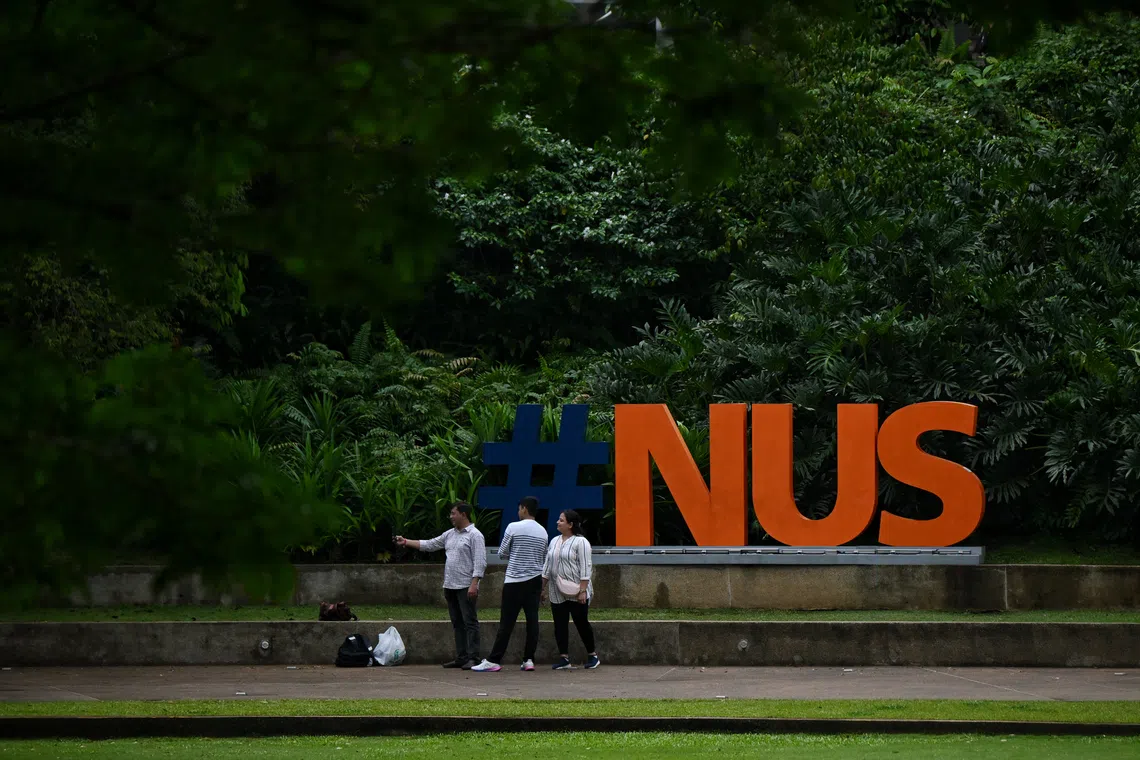NUS implements full work-from-office policy for all full-time staff
Sign up now: Get tips on how to help your child succeed

Since Sept 1, NUS staff from central administration units have resumed working on campus five days a week.
ST PHOTO: KUA CHEE SIONG
- NUS requires all full-time staff to work from the office five days a week starting October 1, following a trend of companies ending work-from-home arrangements.
- Other Singapore universities currently have no plans to change existing flexible work arrangements.
- Some NUS staff feel the policy is unreasonable, citing improvements in technology and workforce efficiency, and the importance of work-life balance.
AI generated
SINGAPORE – All full-time staff at the National University of Singapore (NUS) have had to work from the office five days a week from Oct 1.
Responding to queries from The Straits Times, an NUS spokeswoman said that since Sept 1, NUS staff from central administration units have resumed working on campus five days a week.
This arrangement was extended to the rest of the university from October.
In the reply on Oct 2, she said that based on Ministry of Manpower data, close to 70 per cent of companies in Singapore did not offer telework arrangements in 2023.
“NUS, too, recognises the value of in-person interactions in the workplace,” she said.
The university had earlier reduced its work-from-home days from two days to one in 2023.
The spokeswoman added that it still offers flexible work arrangements, which can be designed for specific job roles.
NUS has 12,000 staff.
Other companies in Singapore and abroad have in the past year required staff to return to the office or spend more days there, citing benefits such as creativity, collaboration and workplace culture.
Technology firm Grab told its employees in October 2024 that they would need to work five days a week in the office from December that year, to facilitate more collaboration and interactions in the office.
A report in 2024 by consultancy KPMG noted that 83 per cent of bosses globally expected a full return to the office in three years, up from 64 per cent in 2023.
ST contacted the other five autonomous universities about their work arrangements. Four of them said they have no current plans to change their existing work-from-home arrangements.
Nanyang Technological University allows eligible staff to work from home one day a week, while staff at the Singapore Management University, Singapore Institute of Technology, Singapore University of Social Sciences and Singapore University of Technology and Design can work remotely or from home for two days per week.
In Singapore, the Tripartite Guidelines on Flexible Work Arrangement Requests were launched in April 2024 to set out how employees can request such arrangements, and how employers can consider them.
An NUS staff member who spoke on condition of anonymity said the full work-from-office policy was announced to staff in August.
Her colleagues were unhappy about the change but did not dare to speak up, she said.
“I find it unreasonable. What difference does one more day in the office make?
“With improvements in workforce efficiency and technology, why are we going backwards instead of forward with flexible work arrangements?”
She said that to work from home, staff will need to put in a formal request by submitting a form.
“Work from home makes a big difference in life satisfaction... Some don’t have an official reason to request to work from home. But we really appreciate the flexibility.”
She added: “Work from home made it possible to get more done.”
Correction note: In an earlier version of the story, we said that close to 70 per cent of companies in Singapore had returned to full office-based work arrangements by 2023. NUS has since clarified that close to 70 per cent of companies in Singapore did not offer telework arrangements in 2023.



